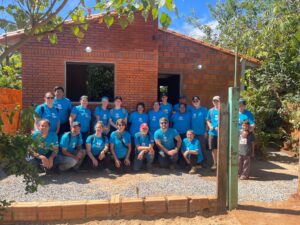 Chloe Henry, Pikes Peak Habitat’s Faith in Action program manager, recently returned from a Habitat Global Village trip to Paraguay. The affiliate there is celebrating its 25th anniversary, so in addition to helping build a home for a local family, group participants had the chance to visit some of the communities where Habitat Paraguay is working and learn about their various initiatives.
Chloe Henry, Pikes Peak Habitat’s Faith in Action program manager, recently returned from a Habitat Global Village trip to Paraguay. The affiliate there is celebrating its 25th anniversary, so in addition to helping build a home for a local family, group participants had the chance to visit some of the communities where Habitat Paraguay is working and learn about their various initiatives.
Getting Ready for Our Global Village Trip.
Henry participated in the trip as preparation for leading a Pikes Peak Habitat Global Village trip to one of our tithe partner countries in 2024.
She emphasizes that Pikes Peak Habitat has a long tradition of tithing — donating 10% of undesignated and unrestricted contributions to international Habitat affiliates and programs. We’ve received Habitat’s Sam Mompongo Award for a lifetime tithe of more than $1 million.
“This is something we’ve always cared about: the idea that everyone, everywhere has a decent place to call home,” she says
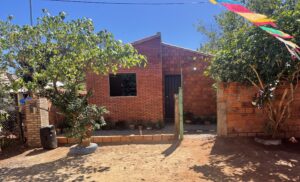 The Global Village program paused during the COVID-19 pandemic and is restarting gradually. That’s why we don’t yet have a specific destination or date for our trip — but we’re hopeful it will happen within the next year! If you’d like to receive updates in the meantime, please fill out the online interest form. Henry is also looking for people to join the Global Village subcommittee (PDF) to help plan and promote the trip. If you want to turn in a subcommittee form, or if you have questions, please reach out via e-mail to Chloe@pikespeakhabitat.org.
The Global Village program paused during the COVID-19 pandemic and is restarting gradually. That’s why we don’t yet have a specific destination or date for our trip — but we’re hopeful it will happen within the next year! If you’d like to receive updates in the meantime, please fill out the online interest form. Henry is also looking for people to join the Global Village subcommittee (PDF) to help plan and promote the trip. If you want to turn in a subcommittee form, or if you have questions, please reach out via e-mail to Chloe@pikespeakhabitat.org.
“It is a very unifying way to be able to work with people, and I would also say from a faith perspective, it’s a great way to see how the Lord is working in different communities through local people,” says Henry. Although she primarily engages with faith communities in her role at Pikes Peak Habitat, both the subcommittee and the trip are open to anyone interested in working for affordable, attainable homeownership in another country. “Global engagement is much broader than” faith communities, she notes.
Paraguayan Culture and Food
A highlight for the trip, says Henry, was getting to experience another culture and its food.
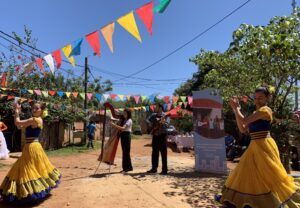
“A harp is very significant in Paraguay,” she notes. “For dinner on Friday, we went to a harp house.” A harp also featured in Norma’s home dedication.
After the dedication, the community held a fair. “Members of the community made snacks and dishes for us to try,” Henry says. Offerings included empanadas and mbeju, which she describes as “basically corn starch, oil, butter, and cheese. It’s kind of like a thick tortilla,” she explains. “It’s one of the most well-known dishes that we had throughout the week.”
She also experienced sopa paraguaya, which she says “translates to Paraguayan soup, but it’s essentially cornbread! It’s solid, it’s not soup at all. And so their big thing that everyone would say is that this is the only solid soup in the world–that was like the tagline!” She explains, “I thought it was going to be like Jello, but it’s essentially cornbread. But if there’s one dish that is literally everywhere, it’s that!”
Habitat Paraguay’s Work
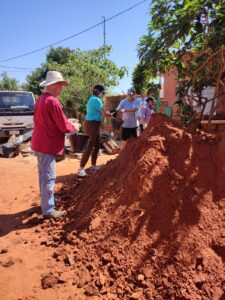
During her trip, Henry and other volunteers worked on a home for Norma and her family. (See the fall print newsletter–coming soon!–for more about this project.) They also had a chance to tour several communities and see Habitat Paraguay’s work in action.
In Luque, the community where the Global Village group volunteered on home construction, Habitat requires partner families to own their land. Henry says this isn’t necessarily typical in Paraguay, where residents may own a home itself but lease land from the government. In fact, land rights are one of the areas where Habitat Paraguay is focusing their advocacy efforts. In Norma’s community, Habitat helps repair existing homes when possible, but often the buildings aren’t salvageable. That was the case for Norma. Most of the residence where she previously lived was torn down, and just enough was left to shelter her and her family while their new home was constructed.
Habitat Paraguay is working in another community where they’re building a gated community of duplexes. In that area, Henry says residents don’t own the land.
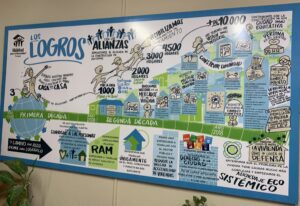
“When they had their 10th anniversary, they had done a hundred homes,” Henry says. “By their 20th anniversary, they had done a thousand, so they are really expanding pretty broadly!”
Beyond construction and repairs, the affiliate is also involved in various community initiatives. The Global Village group visited an area where poverty and crime are more rampant. “We had the opportunity to walk through that whole community with Habitat staff,” says Henry. “We had a police escort! But the super fun part is that they have neighborhood liaisons for each little community, and so we’d keep walking, and then we would pick up somebody who would say, ‘This is my neighborhood, and this is what Habitat was doing, and they fixed my bathroom, and now I have a store in my house where I sell cakes!'”
She explains that in Paraguay, people need licenses to perform specific jobs, so Habitat Paraguay often helps facilitate that process.
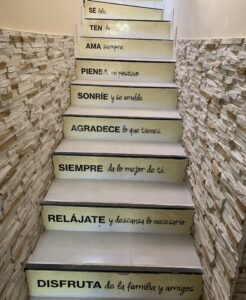
The Global Village participants also visited a youth center in that community. Henry says the center is working with a Roman Catholic-based organization to offer job training to women, and there’s also a hospital in the area.
Then the group toured a school. Habitat Paraguay “has been working with particular schools to have kids identify problems in the community and come up with potential solutions,” explains Henry. Students did a presentation on problems, solutions, resources, and “choices for moving forward with what we can do,” she says. “Habitat has agreed that they will follow the recommendations of a couple of the student projects, which was pretty cool. They spent a lot of time trying to underscore that youth can also participate in a meaningful way.”
The group also visited a community where Habitat Paraguay added clean water and sanitation facilities during COVID-19. Henry says during the pandemic, “what really kept their community alive and well was that everybody would come at night to dinner there, and they would bring what they had to feed people.”
The group also learned about another community that floods annually, so residents would leave for a few months but then return after the waters subsided. Habitat Paraguay served as a liaison between these families and the government, which offered permanent housing on higher ground. The government-built community, where people primarily live in apartments, features churches and a recycling plant, because many of the community members work in recycling.
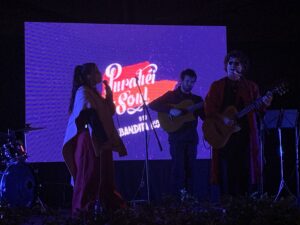 The day after touring the communities, the Global Village group attended a fundraising concert. “The main event was a group that is indigenous; they are Guarani, which is a language and also a people,” explains Henry. The group, Purahei Soul, “had this really beautiful song called ‘Pájarito.’ It’s a very powerful song, because it’s all about how this little bird can fly, and so he can leave as the flood comes and goes, but the people are saying, ‘But we can’t fly; we can’t leave.’ So it’s trying to highlight the issue of these displaced people and where are they supposed to go.”
The day after touring the communities, the Global Village group attended a fundraising concert. “The main event was a group that is indigenous; they are Guarani, which is a language and also a people,” explains Henry. The group, Purahei Soul, “had this really beautiful song called ‘Pájarito.’ It’s a very powerful song, because it’s all about how this little bird can fly, and so he can leave as the flood comes and goes, but the people are saying, ‘But we can’t fly; we can’t leave.’ So it’s trying to highlight the issue of these displaced people and where are they supposed to go.”
Habitat Paraguay is also working on advocacy through personal loans for individuals.
Final Thoughts
Henry appreciated the trip to Paraguay and encourages people to learn more about Global Village.
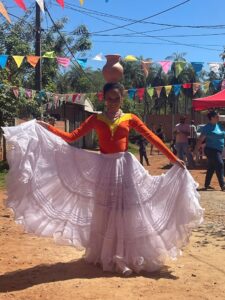
“It’s just a really great opportunity to be able to learn about different cultures and to be able to step outside of your comfort zone a little bit, to try something new, to taste food you never have, to do something that is meaningful for someone else!” she says. “It’s just good for us to be able to build those cross-cultural relationships and to be able to learn from each other.”
